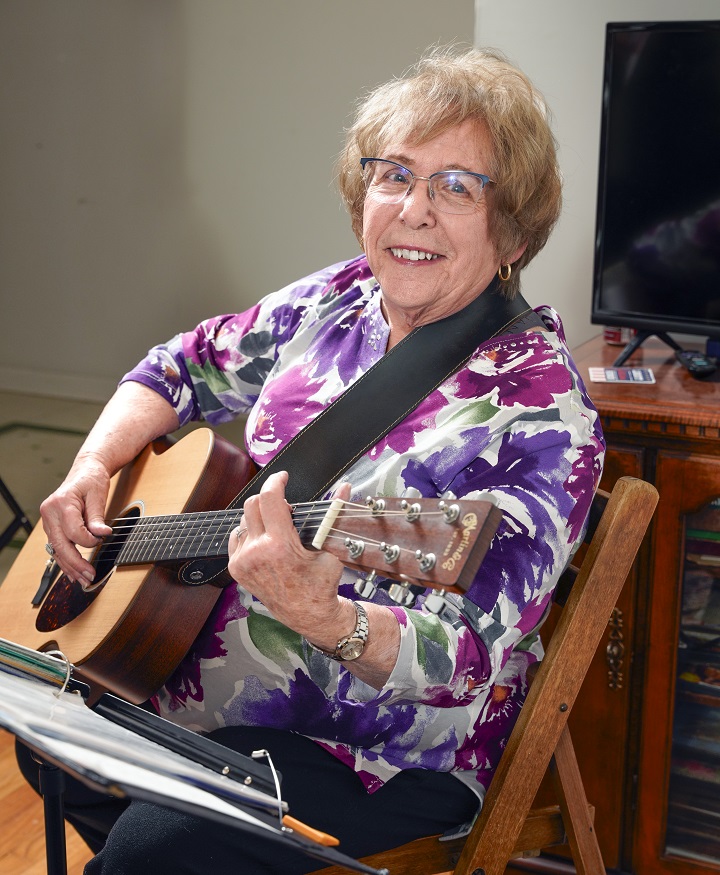Specialty doctors provide expert care for specific health concerns, ranging from ear, nose and...
Read More
“I don’t have time for that!” That’s how 82-year-old June Seltner described the “inconvenience” of having a stroke.

June, whose list of prior jobs includes schoolteacher, daycare owner, pharmacy tech and even salad maker at a deli, still works, cooking and cleaning several times a week for a slightly older friend. She loves playing pinochle and canasta, quilting, square dancing, oil painting, and pursuing her newest passion, learning classical piano. June, who is also a breast cancer survivor, rode horses and mules through state game lands well into her seventies and says she still hikes three miles “every chance I get.”
As a child, June had been first chair violinist in the Philadelphia Youth Orchestra, but put music aside to raise her family with her late husband, John. About four years ago, she took up guitar and now plays regularly in an 18-piece country western band.
Because she is such an active person, June immediately knew something was wrong when she woke one morning in April 2023 and realized she was having trouble getting out of bed.
“I got up and was trying to make my way down the hallway and I was banging into the walls all the way,” she said. “When I looked in the mirror, I saw that my mouth was drooping on one side and one eyelid was not closing. I had had a small stroke years earlier, so I was pretty sure I knew what was happening.”
June called her twin sister, Jane, who picked her up and drove her to Inspira Medical Center Mullica Hill.
June couldn’t walk unassisted, so Jane went into the emergency room and the Inspira team came out to the car, helped her into a wheelchair and brought her inside.
“I knew that during a stroke, time was important, so I made sure that when I got there I told them that it was exactly 7:20 a.m. when I noticed the first symptom,” June said.
June said the team’s approach to her care, especially since they had no advance notice of her arrival, was “perfect.”
Upon June’s arrival a Code Stroke was called by Emergency Medicine physician Michael Coletta, M.D. This set into action a series of diagnostic and imaging studies that allow physicians to quickly confirm or rule out a stroke.
“I was immediately surrounded by a team of health care workers. They took me right past the desk and into a room in the Emergency Depatrment. They started an IV and blood work within minutes. It was the most efficient thing I have ever seen,” she said.
A teleneurology call was set up with Tudor Jovin, M.D., at Cooper University Hospital. Dr. Jovin is a neurologist and a provider member of Cooper and Inspira Neuroscience. He consulted with Dr. Coletta and they confirmed that June was experiencing a stroke.
Because she was within the window for effective treatment of her type of stroke – usually 2-3 hours from the onset of symptoms – she was given a powerful blood thinning medication, called tenectplase or TNK, that is used to treat a stroke caused by a blood clot.
“Dr. Jovin explained everything, including the risks, to me quickly, but completely, and in a way I could understand. I told him, let’s do it because I have too much going on!”
June was transferred to the intensive care unit, where she said Inspira staff brought her a small table so she and Jane could play cards while she recovered. She went home on the third day after her stroke.
June said it took about 3 months to “feel like myself again,” but she is back to almost all her previous activities. She also said that one thing she would do differently in the future was follow the advice of a friend who is a retired registered nurse.
“She told me to call 911 before I call a family member!”
June said having access to stroke care locally was the key to her effective treatment and recovery.
“It meant the difference between having the full life I have now, and possibly being in a nursing home or needing everyday care myself. Having the best, quick care means returning to your normal life instead of having to reevaluate your entire way of doing things,” she said.
“The bottom line is that Inspira is a great hospital. And it is such a help to not have to run somewhere farther away. Their link to a hospital like Cooper is amazing. We are getting the best of both worlds here. It’s a win for everyone.”
“Inspira is a godsend,” she said.
Inspira’s Medical Centers are member locations of Cooper and Inspira Neuroscience.

Specialty doctors provide expert care for specific health concerns, ranging from ear, nose and...
Read More
Understanding the most common surgeries can help prepare patients for potential procedures. Knowing...
Read More
Learn about how transcarotid artery revascularization (TCAR) compares to traditional treatments like...
Read More
The material set forth in this site in no way seeks to diagnose or treat illness or to serve as a substitute for professional medical care. Please speak with your health care provider if you have a health concern or if you are considering adopting any exercise program or dietary guidelines. For permission to reprint any portion of this website or to be removed from a notification list, please contact us at (856) 537-6772